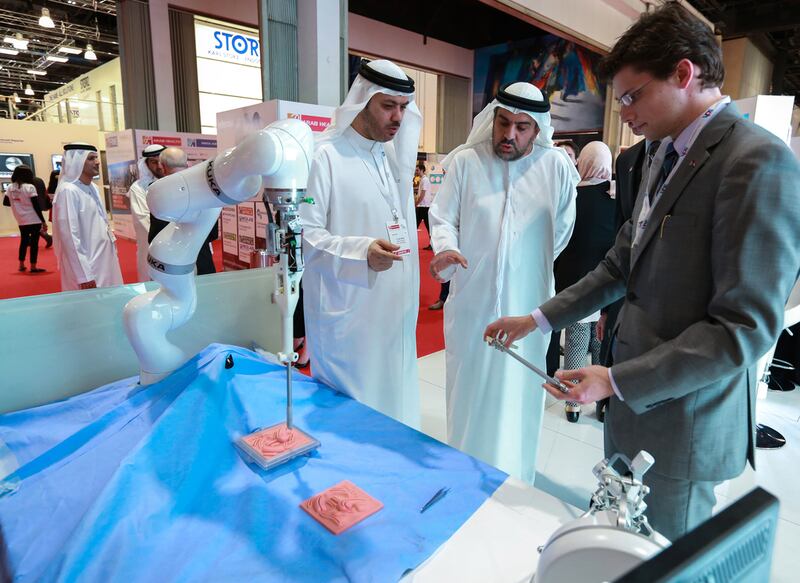ABU DHABI // Would you put your life in the hands of a hospital robot? If so, you’re part of a growing number of people prepared to embrace new health technology that could reduce our reliance on doctors.
A survey of 11,000 people from 12 countries showed people were increasingly willing to engage with robots and artificial intelligence – if it meant better access to reliable and efficient health care.
Half of respondents in the UAE were happy for a robot rather than a doctor to perform a -minor surgical procedure, with the proportion climbing to 73 per cent when all respondents were taken into consideration.
The figure remained relatively high when it came to major surgery, such as knee or hip replacement, removal of a tumour or heart surgery, with 44 per cent of UAE respondents willing to be operated on by a robot.
“Whether we like it or not, AI and robotics are the future of health care, and the Middle East is poised to take advantage,” said Dr Tim Wilson, a health industries leader at consultants PricewaterhouseCoopers.
“We would like to see the Middle East invest and become a global centre of excellence and a place that other countries look to for healthcare innovation, AI and robotics.”
Although the human touch remains crucial to a positive healthcare experience, speed and accuracy of diagnosis were viewed by patients as vital in developing trust.
“Humans empathise with humans on pain and suffering, while machines cannot, hence the human angle can never be replaced,” said Prasanth Manghat, executive director of NMC Healthcare in Abu Dhabi.
“Technology is helping in remote monitoring of diseases, wearable diagnostic devices and helping the elderly in their daily lifestyle.”
Mr Manghat said that robotics and AI could relieve pressure on busy doctors by helping with disease monitoring and early warning systems.
“The care giver will always need to decipher feedback into the decision-making system to give the best patient care,” he said.
The survey found two thirds of the Middle East respondents were willing to replace human doctors with AI and robots, with 62 per cent agreeing in the UAE. Just 26 per cent of those surveyed in the UAE were against technology replacing human doctors.
Dr Atul Peters, a specialist bariatric surgeon at Medeor 24x7 Hospital, Dubai, said although advancements had changed the face of medicine, some robotic surgeries could be slow.
“There has been a big leap in the new generation of surgical staplers, causing less tissue damage, better homeostasis during surgery and the wider use of robotics in other surgical fields,” he said.
“Robotic surgery is far more tedious and time consuming with the current robotics. Advancements in robotics may help us by reducing surgical time, and doing precise movements, such as brain tumour surgery, where margins of error are very small.”
A combination of clinical workforce shortages and a young, digitally savvy population in the Middle East means the region could leapfrog other countries in AI and robotics in health care.
Robots were first used in urology surgery in the 1980s, and have since developed to become highly complex surgical machines to either aid a human surgeon or carry out operations independently.
Robo Doc, an interactive hospital robot that allows specialists to remotely examine and diagnose patients, is widely used at Hatta Hospital, and is helping to reduce costs. A conventional doctor evaluating a patient at a clinic costs about US$90 (Dh330), whereas Robo Doc can do it for about $40.
According to the American Cancer Society, 12.1 million mammograms are performed in the US every year, but a high proportion yield false results, leading to one in two healthy women being told they have cancer. The use of AI is enabling review and translation of mammograms 30 times faster with 99 per cent accuracy.
Google’s DeepMind Health is also helping with more accurate diagnosis.
“Health care is not under threat of losing its ground to technology, but it can aid health care rather than replace the care giver,” Mr Manghat said.
nwebster@thenational.ae






